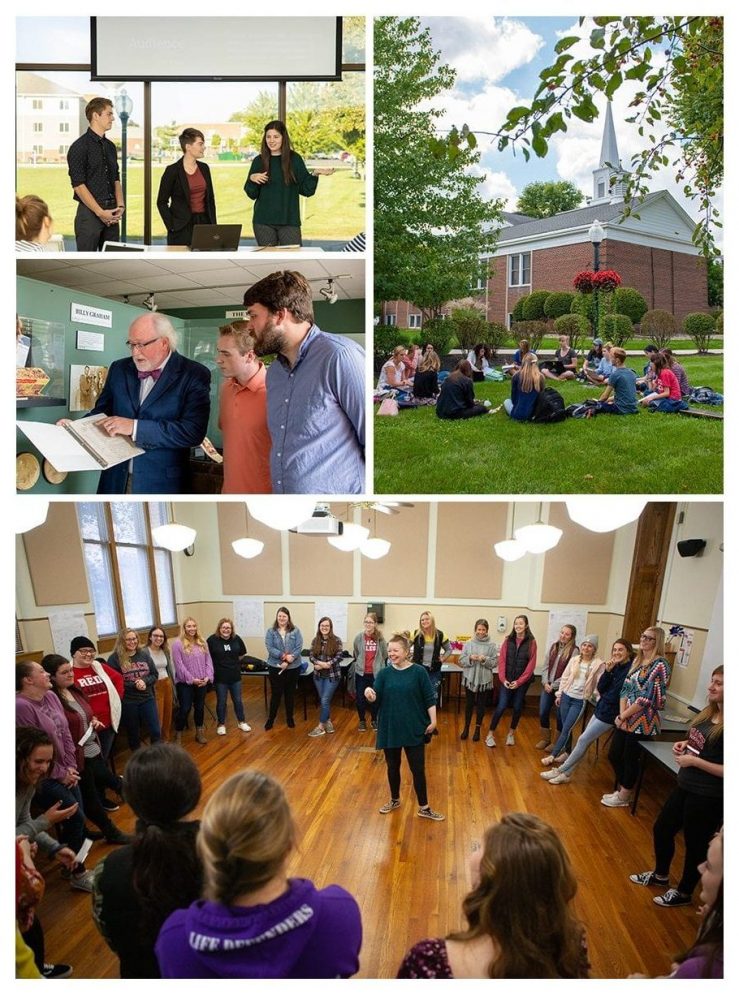Maybe you’ve been thoughtfully considering a humanities major for some time, or perhaps this is the first time you’re hearing the word “humanities.” Either way, it’s important to understand why are the humanities important and what humanities majors contribute to our world.
Humanities majors encompass a broad range of studies. At Grace, our Department of Humanities includes four distinct yet interrelated programs (Communication, English & Journalism, History & Political Science, Modern Languages) as well as the interdisciplinary studies major. This department is now the largest at Grace and includes diverse majors and minors such as pre-law, museum studies, journalism, English education, and digital communication. It is also the academic home of the Winona History Center, the Institute for Global Studies, and The Sounding Board newspaper.
Grace College Director of the Modern Languages Program, Dr. Lindsey Richter, and Chair of the Department of Humanities, Dr. Lauren Rich, have answered some of our questions about why the humanities are important.
In your own words, how would you define the humanities?
Dr. Richter: The humanities focus on the pursuit of the good, the true, and the beautiful. They are the cultivation of human flourishing.
Dr. Rich: To study the humanities is to study what it means to be fully human. The humanities encompass the study of human expression, experience, and flourishing, at both the individual and societal level.
Why are the humanities important, and why should we study these disciplines?
Dr. Richter: Studying humanistic disciplines permits us to engage with far-flung communities—across time, across space, between cultures and languages. The humanities teach us who we have been and who we are, but also who we can be—demanding more of our imagination, our aspirations. In an increasingly divided world, the humanities are a site in which real dialogue between people of different beliefs is possible, because studying the humanities draws us away from the simple truths of ideologies and toward the slender knowledge of the highest things.
Dr. Rich: From a practical and economic perspective, understanding complex problems, communicating clearly, thinking critically and creatively, and adapting to rapidly changing contexts has never been more in-demand among employers. At a deeper level, the humanities are foundational to both democratic society and to what philosophers call “the good life,” meaning a life of purpose, virtue, and fulfillment.
If the Department of Humanities had a uniting motto or a common goal, what would that be?
Dr. Richter: Finding in all stories—of ourselves, of our neighbors, and of our world—the seed of the one true story, God’s overcoming of sin and death to redeem humankind.
Dr. Rich: “All truth is God’s truth.”
Why are the humanities important to our graduates, specifically? In other words, what do they contribute to our world?
Dr. Richter: I believe that our students are sent out as bridge-builders between disparate communities, as thinkers who are undeterred by the unknown, and as individuals who act with redemptive power in the culture they find themselves in, cultivating the good, the true, and the beautiful in their world.
Dr. Rich: Humanities majors are, in a very real sense, lifelong learners. They graduate with the tools, training, and motivation to continue learning, researching, adapting, and growing throughout their lives. It’s no surprise that many of the most effective leaders — from industry to politics to media — majored in humanities. Even students whose career plans require specific technical preparation, such as pre-health or accounting majors, often find that a second major or minor in humanities gives them a leg up in the job market and the soft skills to navigate new work environments and promotion paths.
As Richter and Rich mention, our world depends on humanities majors. When you consider people of influence, you might be surprised to find out how many of them obtained degrees in humanities. CEOs of major corporations such as Starbucks and Walt Disney World started their careers with humanities majors. And this is true of several administrative leaders at Grace as well.
Associate Dean of Diversity and Inclusion at Grace, Cokiesha Bailey Robinson, studied journalism in college. She reflected on the value of the humanities; “Through humanities, we are given a front-row seat to the world and many different cultures. We are given a pair of glasses to see the experiences of others more clearly. We are presented to many different cultural influencers and introduced to their beautiful life work and diverse voices. We are also able to engage the past, enjoy and evaluate the present and anticipate the future because of the value of humanities.”
At Grace, we affirm the importance of humanities, and if you’ve made it this far into the blog, we’re assuming you do too! So, what say you? What’s your response to the question, “Why are the humanities important?” We would love to hear your reasons on our social media channels!
Now, are you ready to begin your own journey to pursue the good, the true, and the beautiful?
Learn more about the humanities majors that interest you.




